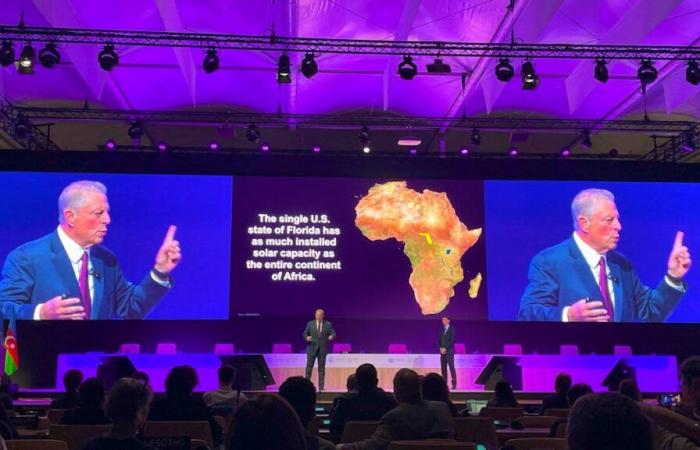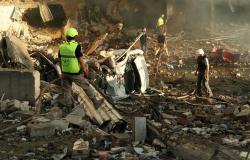Al Gore speaks at COP29 in Baku.
AFP
The negotiators are still struggling to agree on Saturday after a week of painful negotiations at COP29 in Baku, but they are counting on the G20 summit in Rio and the upcoming arrival of ministers to unblock the situation.
“There is still a long way to go, but everyone is very aware of the challenges, halfway through the COP,” UN Climate chief Simon Stiell said on Saturday.
A new proposal for a compromise text on financing the fight against climate change circulated Friday evening but with multiple options still open on 25 pages before the arrival of ministers for the final week. “There is still no clear sign on the direction because the text has not yet been sufficiently shortened, with many options still on the table,” laments one observer.
This year, COP29, hosted by Azerbaijan, must conclude with a “New Quantified Collective Objective”, or NCQG according to its English acronym.
This new objective will replace from next year the previous one, which provided for rich countries to provide 100 billion dollars per year to help the developing world limit its greenhouse gas emissions and adapt to change. climatic.
But many questions remain debated in the corridors of the Olympic stadium in the Azerbaijani capital: who should pay, what types of funding to count in the total, on what time scale… and above all how much?
An observer reported a “tense” climate in the room where informal discussions were held on Friday. A difficulty put into perspective by an experienced negotiator for whom parallel meetings between great powers are constructive.
«Elan»
These questions pit rich countries against each other and the developing world, which itself is trying to present a united front to demand a total of 1,300 billion dollars annually in funding, despite dissonant notes.
Some have in fact put forward more specific demands: the 45 least developed countries are demanding that at least 220 billion be earmarked for them each year, and the small island developing states 39 billion.
The Europeans, who are refraining for the moment from discussing a specific figure, are for their part frustrated at still having to discuss a very detailed text. “We are very worried” about this step backwards after a year of prior negotiations, said the European Union’s chief negotiator, Jacob Werksman, this week.
But Westerners believed they saw a signal of goodwill from China. Beijing has for the first time publicly mentioned and quantified its “investments in climate action in other developing countries”, whereas until now it has limited itself to qualifying its payments as “South-South cooperation”.
“It is urgent that the world leaders who meet for the G20 in Rio provide real political momentum and energy”, without which “a serious risk” weighs on the outcome of the negotiations, judges Friederike Röder, of the NGO Global Citizen.
The G20 will bring together the largest economies on the planet on Monday and Tuesday in Rio. Brazil is keen to find a solution to the financial issue before COP30 which it will host next year in Belem, negotiators and observers believe.
“The G20 leaders must affirm loud and clear that international cooperation remains the best and only chance for humanity to survive global warming,” urges Simon Stiell.
(afp)






